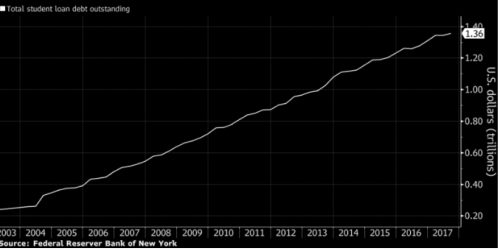Student loan debt has skyrocketed over the last 10 years:

Once a student takes on this type of loan debt, they cannot get rid of it even in bankruptcy.
Everyone told me when I was a teenager that I HAD to go to college and it was incredibly important for my future. Everyone continues to tell American teenagers that college is the key to a good life. Unfortunately, everyone is wrong on this.
College was very wrong for me. I had started a business doing landscaping with a friend at that time and was seeing success with it. I closed it down and went to college, where I spent four years drinking and partying and majoring in business. During that four year period, I took only 3 courses that actually helped me in life (Intro to Law, Accounting, Microeconomics). The rest of my approximately 45 courses ranged from useless (terrible professor in Macroeconomics) to absurd (a class named Murder, that was about… murders). I even went to a pretty strong state school, the University of Washington. The Business School was ranked #11 in the world at the time I attended. I contributed nothing to society during this period and picked up an alcohol problem I struggled with the rest of my 20’s. According to the NIH, 60% of college students drank alcohol in the last month and 2 out of 3 of those binge drank in that time frame.
I don’t think my experience was unique… I actually think this is one of the better outcomes from four years of college. Most people I know who attended college had a lot more debt than I did, got worse first jobs, humanities degrees ** (which are basically just degrees in entertainment, about as helpful to the world as majoring in football or underwater basket weaving).
What should you do instead of going to college? Use the internet for your education. Every passing day shows better and better online courses for free. Any subject you would study at a university at any level is now online for you to learn in full completely free. A few places to start: Udacity, Khan Academy, Laracasts, Wikipedia, and your Kindle. Those are just a few of my favorites I personally have used. I also strongly recommend finding whatever career you want, then offering yourself as free labor – “unpaid intern” – for a year to apprentice with someone doing the job you want. You will learn all the practical skills of the work very rapidly and actually see if you like the field quickly.
But won’t you be missing out on the great networking of college? If by great networking, you mean hanging out with people with no jobs or purpose who spend most of their time drinking, sure. If you want a network of people who can actually help your career later, attend conferences / meetups / events and work internships within your field. If you do this for four years, you will develop a network of real professionals (many with years of experience in the field and senior positions) who can help you find a job. Who will be better at helping you find a job – a 22 year old friend who has never had a real job or a 46 year old senior manager at a major corporation?
But what if I’m not self motivated, won’t the structure of college make sure I actually learn stuff? Nope. If you’re not self motivated, you will have difficulty achieving anything in life. College will just delay the inevitable issues that will come up. The good news is you can build your self motivation incrementally and improve over time (mostly by building good habits). If you aren’t self motivated to learn by reading on your own, you will not be self motivated to properly do the coursework and learn in college either.
But isn’t that piece of paper extremely important for employers in vetting out job applicants? Unfortunately, this is the strongest argument against my idea of skipping formal college. Many employers do look at the university on your resume and use that to help filter candidates. I do think that more and more employers are like me though (I have 100 full time people) and completely ignore the university listed… I use actual skills tests to see who has the best ability to do the job in question. Further, the network you develop while doing unpaid internships and attending events will help you overcome the hurdle of not having a college listed on your resume.
So what are reasons I think someone should go to college? I think if you need access to incredibly expensive and regulated equipment – like nuclear reactors or industrial robots – college makes sense for you. If you want to do certain types of cutting edge scientific research, college will give you the opportunity to do so. If you want to teach others, you need to go to college and get certified so you can legally do so. I think this covers around 5% of people.
** – A lot of people insist that majoring in the humanities is a higher calling, far more important than the shallow capitalist goals of getting a job. I do agree that great literature, drama, art, philosophy, and music are important to society. Each of these though are forms of entertainment. People pay to read books or attend shows. People who are interested in these areas will be motivated to participate on their own time and don’t need to pay tens of thousands of dollars to do so. Save your money and do this for free.